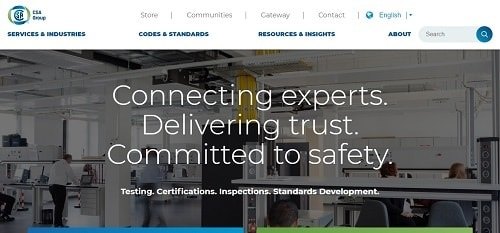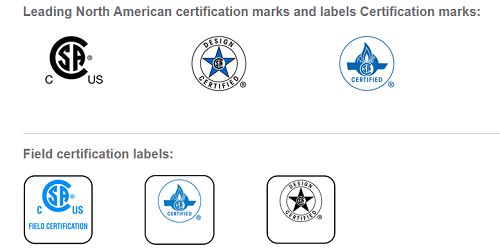Designing food equipment that is safe, reliable, and functional is a challenging feat, and most manufacturers want their customers to have confidence that their equipment meets all applicable regulatory standards. CSA, otherwise known as the Canadian Standards Association, is a group that tests and awards all types of equipment with the certifications they need to show that all standards are met.
Because CSA is a global provider of all things certification, inspection, and testing with a presence in over 14 countries, the group provides different levels of certifications that can be tailor-made to fit the regulations of the region as well as the product. Today, we’ll discuss the CSA approval and certification process for its North American market, which consists of the United States and Canada.

Screenshot via CSA Group
Let’s take a look at the necessary steps that must be taken to obtain a CSA certification for food equipment:
Keep reading to find out what’s involved in each of these steps in the approval process.
Your very first step in getting your food equipment product CSA-certified is to get in touch with the CSA Group. There are three ways you can do this:
To speed up the process, contact the CSA Group when your product is ready for inspection, not before. If you have any questions about certification while you’re in the design process, review the CSA Codes and Standards.
Now that you’ve initiated contact with the CSA Group, it’s time to provide the organization with all of the product information they need to certify the food equipment. Here are the basics that you’ll need to supply to the group:
Here are the additional materials that you might need to supply to CSA, provided they correspond to your product:
Once all of the above product information has been submitted, you will receive a quote from the CSA group, which includes the estimated time frame for the certification project’s completion date.
When all of the above information is received, a representative from the CSA Group will contact you regarding your next steps. This is the point where you will learn more about the framework that your food equipment product will be tested against, including the relevant standards. It’s also when you will learn more about the exact type of CSA certification you need as well as the specific CSA mark that comes with it.
As mentioned, the CSA Group awards several types of certifications depending on the product, manufacturers, use, and location. These include model certifications, witnessed manufacturer’s testing for certification, field certification, and many others.

Screenshot via CSA Group, depicting examples of North American certification marks
Once you have undergone the entire CSA certification process and you have the final product listing number in-hand, it’s time to attach the CSA mark. Luckily, this is the easiest step in the CSA-certification process, but you will want to make sure that your mark is attached using a quality label that’s durable enough to withstand the equipment’s typical operating environment.
Metalphoto of Cincinnati offers a range of durable custom labels and tags designed for a variety of applications, including machinery and equipment labels, inspection and compliance tags, equipment tags, and more. Metalphoto® Labels and Tags, our most durable and popular material (and a CSA-approved material), are the ideal choice for applications that demand extreme durability, while our Anodized Aluminum Labels and Tags are an economical choice for higher-volume applications and are suitable for applications requiring exceptional abrasion resistance, as well as resistance to chemicals, solvents, and corrosion. Browse our full range of custom labels and tags to find the ideal solution for your company’s needs.
Our sales engineers are experts in automatic asset tracking, tagging and identification,a nd can answer all your questions. Get in touch now.
Lets Talk ›